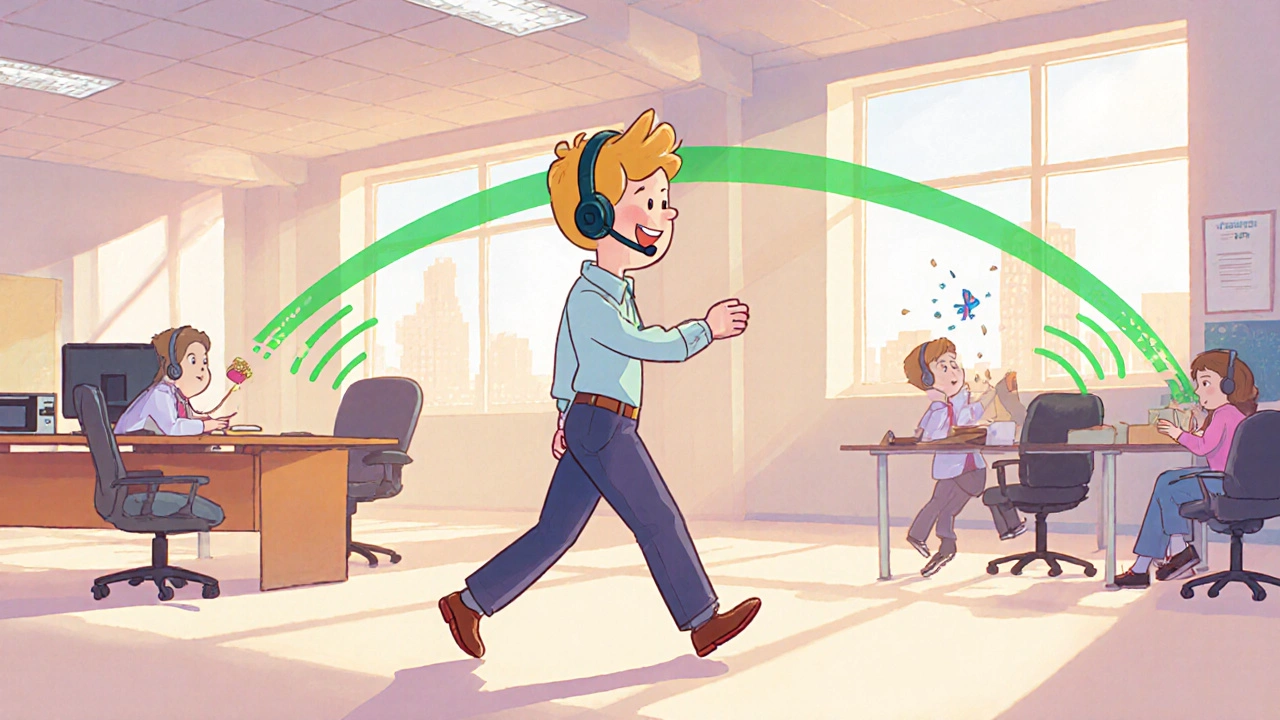Imagine you’re on a call with a client, walking from your desk to the conference room, and your headset cuts out. Again. That’s not just annoying-it’s unprofessional. For businesses relying on VoIP phones, the right wireless headset isn’t a luxury. It’s a necessity. And when it comes to choosing between DECT and Bluetooth, the decision isn’t about which tech is newer or fancier. It’s about which one actually works for your team’s day-to-day reality.
DECT Headsets: Built for the Office
DECT, or Digital Enhanced Cordless Telecommunications, wasn’t designed for your phone. It was built for the office. Since the 1980s, it’s been the backbone of cordless business phones. Today, it’s the go-to for call centers, reception desks, and teams that stay put but need to move around their workspace.
Here’s what makes DECT stand out: range. Most DECT headsets give you 80 to 350 meters of clear wireless connection. That’s not a guess. It’s real. Models like the Poly Savi 8445 Office UC deliver up to 180 meters-enough to walk from your desk, through the break room, into a side office, and still stay connected. Bluetooth? Not even close. Standard Bluetooth headsets max out at 10 meters. Even the strongest Class 1 Bluetooth only hits 30 meters. In a real office with walls, metal cabinets, and other wireless devices, Bluetooth often drops at 15 meters. DECT doesn’t care.
It also doesn’t interfere. DECT uses the 1.9 GHz band. Bluetooth uses 2.4 GHz-the same band as Wi-Fi routers, microwaves, and half the gadgets in your office. That’s why you get crackles and dropouts with Bluetooth in crowded spaces. DECT? It’s quiet. No interference. No surprises.
And yes, it’s secure. DECT uses 64-bit encryption. Bluetooth uses 128-bit. On paper, Bluetooth wins. But here’s the catch: once your DECT headset is paired with its base station, the chance of someone eavesdropping is virtually zero. Enterprise IT teams don’t worry about it because they don’t have to. The system just works.
DECT headsets also last longer on a single charge. Most offer 10 hours of talk time and 50 hours of standby. Bluetooth headsets? You’re lucky if you get 8 hours. And while DECT needs a base station plugged into your VoIP system, that base is stable. It doesn’t switch connections. It doesn’t forget your headset. It just works.
Bluetooth Headsets: Flexibility Over Range
If your team is always on the move-working from home, hopping between offices, or juggling calls on their phone and computer-Bluetooth is the only choice that makes sense.
Here’s why: one headset, eight devices. A single Bluetooth headset can pair with your desk phone, your laptop, your tablet, your smartphone, and even your smartwatch. You don’t need to swap headsets when you switch tasks. You just tap a button. That’s why sales reps, field service workers, and hybrid employees love Bluetooth. You can take it home without hauling a base station. No extra cables. No extra gear.
Setup is simpler too. Pairing a Bluetooth headset to your laptop takes 30 seconds. Pairing a DECT headset? You need to plug in the base, power it on, and sync it. It’s not hard, but it’s not instant. And if you’re moving between locations, you can’t just grab your DECT headset-you need the base too. That’s a dealbreaker for remote workers.
Cost is another factor. Bluetooth headsets start at under £50. A decent DECT system? You’re looking at £150 or more, just for the headset and base. For small teams or individuals, that upfront cost matters. And while DECT headsets last longer and need fewer replacements, Bluetooth models are easier to replace if they break.
But don’t be fooled by the price. Bluetooth’s range limitation isn’t just a number-it’s a daily frustration. If you step away from your desk to grab coffee and your headset disconnects, you miss part of the call. You have to reconnect. You lose momentum. In a fast-paced sales or support role, that’s lost time. And lost trust.
Hybrid Headsets: The Best of Both Worlds?
Here’s the twist: the market isn’t stuck in the past. Companies like Poly and Jabra now sell hybrid headsets that do both. The Poly Savi 8420 Office, for example, connects via DECT to your desk phone and via Bluetooth to your phone or computer. You get the range and stability of DECT for office calls-and the mobility of Bluetooth for mobile calls.
This isn’t a gimmick. It’s a response to how people actually work now. You might spend your morning on a Zoom call from your desk, your afternoon on a client call from your kitchen, and your evening on a personal call from your couch. A hybrid headset handles all of it.
But here’s the catch: hybrid headsets cost more. They’re not cheaper than DECT or Bluetooth alone. They’re the premium option. If you only need one function, you’re paying extra for the other. But if your team needs flexibility and reliability, this is the sweet spot.
Who Should Use DECT?
DECT is the default for:
- Call centers with 20+ agents
- Teams that stay in one building but need to move around
- Environments with heavy Wi-Fi or wireless interference
- Businesses that want long-term durability and fewer replacements
- Anyone who needs to talk for 8+ hours straight without recharging
If your team spends most of their day on the phone, DECT gives them freedom without compromise. No dropouts. No lag. No guesswork.
Who Should Use Bluetooth?
Bluetooth wins for:
- Hybrid workers who split time between office and home
- Employees who use multiple devices daily (phone, laptop, tablet)
- Small teams or solo workers with tight budgets
- People who travel or work from different locations
- Teams that don’t need more than 10 meters of range
If you’re the kind of person who answers a call while walking the dog, Bluetooth makes sense. If you’re the kind of person who needs to walk across a warehouse and still hear your client clearly, you’re better off with DECT.

Real-World Trade-Offs
Let’s cut through the marketing. Here’s what actually happens in real offices:
- Call center workers using DECT report fewer complaints about dropped calls than those using Bluetooth.
- Hybrid workers using Bluetooth say they appreciate not having to carry a base station home.
- IT managers who’ve switched from Bluetooth to DECT say their helpdesk tickets for headset issues dropped by 60%.
- People who bought Bluetooth headsets for their home office often end up buying a DECT headset later-because they kept losing connection.
There’s no perfect choice. Only the right choice for your situation.
What’s the Future?
DECT isn’t going away. Bluetooth isn’t taking over. They’re both here to stay-but for different reasons. DECT will keep dominating in environments where reliability is non-negotiable. Bluetooth will keep growing as remote work expands.
The real trend? Hybrid headsets. They’re not just a middle ground. They’re the future of flexible work. And manufacturers like Poly and Jabra are investing heavily in them.
So if you’re upgrading your headsets this year, don’t just pick the cheapest or the newest. Pick the one that matches how your team actually works. Because in the end, it’s not about the technology. It’s about keeping your conversations clear, uninterrupted, and professional.
Can I use a DECT headset with my mobile phone?
Standard DECT headsets connect only to their dedicated base station, which must be plugged into your VoIP desk phone or computer. They can’t pair directly with mobile phones. However, hybrid DECT/Bluetooth headsets like the Poly Savi 8420 let you connect to both your desk phone via DECT and your mobile phone via Bluetooth.
Is DECT more secure than Bluetooth?
Bluetooth uses stronger encryption (128-bit vs. DECT’s 64-bit), but in practice, both are secure for business use. Once paired, the chance of someone intercepting a call is extremely low for either. Enterprise environments trust DECT because it’s designed for dedicated, stable connections-not because it’s technically more secure on paper.
Do I need a base station for Bluetooth headsets?
No. Bluetooth headsets connect directly to your devices-your computer, phone, or tablet-without any extra hardware. That’s one of their biggest advantages. DECT, on the other hand, requires a base station connected to your VoIP system.
Which lasts longer: DECT or Bluetooth headsets?
DECT headsets typically last longer. They’re built for heavy daily use in business environments and often have better battery life (10+ hours talk time). Bluetooth headsets are more prone to wear from frequent pairing/unpairing and are often designed for lighter use. Businesses report lower replacement rates with DECT systems over time.
Can I use Bluetooth headsets in a call center?
You can, but it’s not recommended. Bluetooth’s limited range and susceptibility to interference make it unreliable in busy call centers with dozens of users and wireless devices. DECT is the industry standard for call centers because it delivers consistent, drop-free performance-even in crowded environments.
Are hybrid headsets worth the extra cost?
If your team works both in the office and remotely, yes. Hybrid headsets eliminate the need to carry two devices. They give you DECT’s reliability for desk calls and Bluetooth’s flexibility for mobile calls. The upfront cost is higher, but the convenience and productivity gains often justify it for hybrid workforces.
